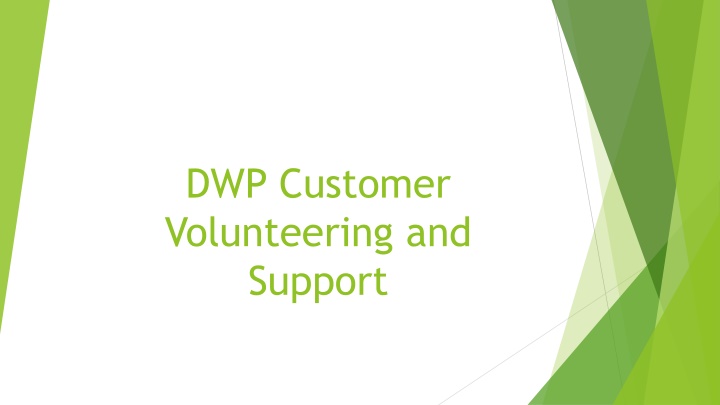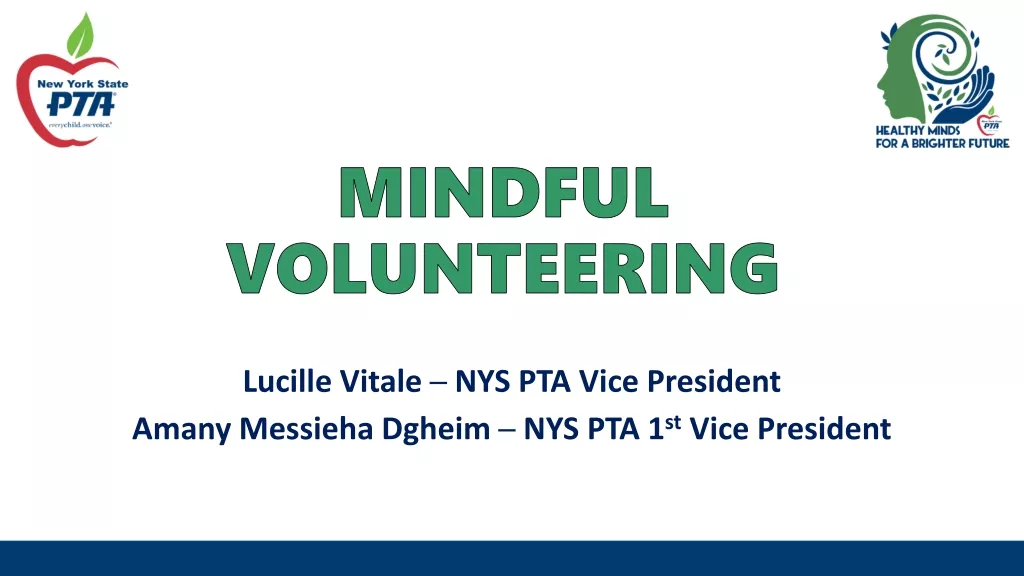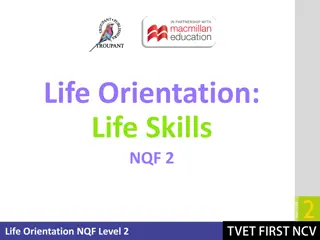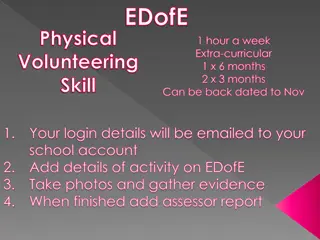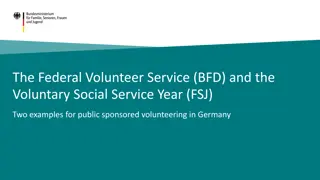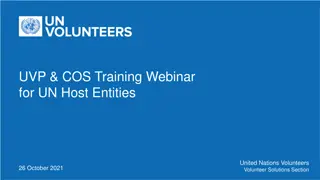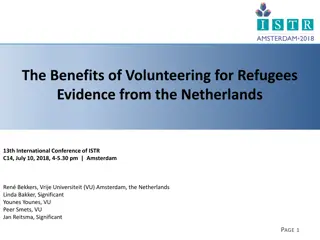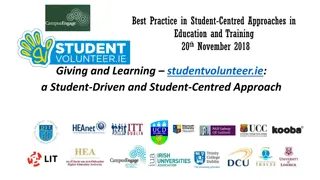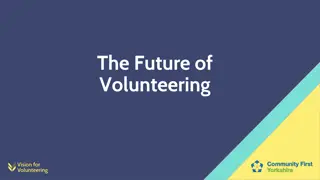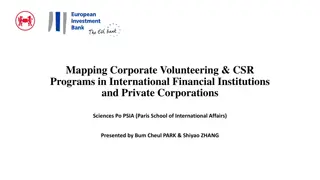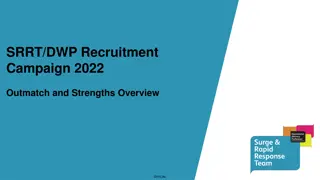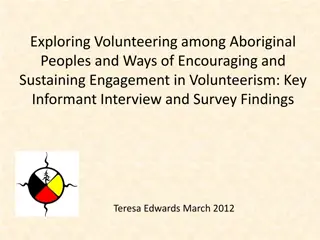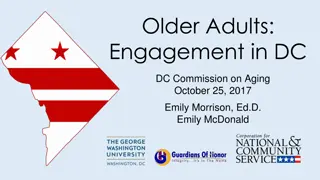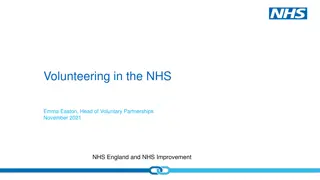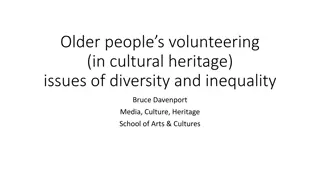Volunteering and Support within DWP Programs
The Department of Work and Pensions encourages volunteering as a means of skill development, community benefits, and enhancing job prospects. Programs like Universal Credit, Jobseekers Allowance (JSA), and Employment Support Allowance (ESA) support claimants in volunteering opportunities with specific guidelines to follow.
Download Presentation

Please find below an Image/Link to download the presentation.
The content on the website is provided AS IS for your information and personal use only. It may not be sold, licensed, or shared on other websites without obtaining consent from the author.If you encounter any issues during the download, it is possible that the publisher has removed the file from their server.
You are allowed to download the files provided on this website for personal or commercial use, subject to the condition that they are used lawfully. All files are the property of their respective owners.
The content on the website is provided AS IS for your information and personal use only. It may not be sold, licensed, or shared on other websites without obtaining consent from the author.
E N D
Presentation Transcript
DWP Customer Volunteering and Support
Volunteering The Department of Work and Pensions recognise the value of voluntary activity in both developing skills which can be transferred into the world of paid work and in terms of benefits for local communities and the wider society. Volunteering is particularly useful for someone who has been out of the labour market for some time and is looking to build up their confidence and their CV at the same time.
Universal Credit Universal Credit Claimants are encouraged to spend time volunteering. Voluntary work or activity is agreed between the claimant and their work coach called a claimant commitment and can count towards their work search requirement. The time agreed for the voluntary work or activity must not exceed 50% of the claimant s expected number of hours per week for work search. If the claimant volunteers for a charity organisation for 20 hours a week and their commitments are to undertake 30 hours per week for work search and work preparation, 15 hours (50% of 30) will count towards their work search requirement.
Jobseekers Allowance (JSA) Volunteering There is no limit on the number of hours you can spend volunteering as long you continue to meet the conditions of JSA. You must let your Work Coach know before you or your partner, if you have one begin any volunteering, and complete form VOL1 You or your partner must not receive any payment for volunteering other than to cover reasonably incurred expenses such as bus fares etc. The volunteering must be for a registered charity, and must not interfere with the core job search. You CAN also volunteer for the following: volunteer with a charity or other voluntary organisation volunteer with a public sector organisation volunteer with a private sector company help your community You CANNOT do volunteering for a close relative
Employment Support Allowance (ESA) Volunteering There is no limit on the number of hours you can spend volunteering as long you continue to meet the conditions of ESA. You must let your Work Coach know before you or your partner, if you have one begin any volunteering, and complete form VOL1 You or your partner must not receive any payment for volunteering other than to cover reasonably incurred expenses such as bus fares etc. The volunteering must be for a registered charity, and must not interfere with the core job search. You CAN also volunteer for the following: volunteer with a charity or other voluntary organisation volunteer with a public sector organisation volunteer with a private sector company help your community You CANNOT do volunteering for a close relative
Employment Support Allowance (ESA) Permitted Work Permitted Work (PW) allows you to: work for less than 16 hours per week (on average) indefinitely and earn no more than the Permitted Work earnings limit per week while remaining on benefit. The earnings for Permitted Work Lower Limit remains at 20.00. apply for Access to Work support Permitted Work rules support the government s commitment to removing barriers to work for people who want to take steps back to work. You must tell us about work (permitted work or any other work) and changes to their work as soon as possible in the same way as other changes in circumstances. You do not need your doctor's approval before doing permitted work. Referrals for a medical assessment will not be initiated because permitted work starts.
Employment Support Allowance (ESA) Supported Permitted Work Your work must be supervised by someone whose job it is to arrange work for people with disabilities. This must be a public or local authority, community interest company or voluntary organisation. Supported employment is also applicable where work is part of a treatment programme done under medical supervision while the person is an in-patient, or is regularly attending as an out-patient of a hospital or similar institution. Currently you can earn no more than the SPW rate of 140.00 per week. There is no limit to the number of hours worked. You must remain on benefit for the duration of the work.
Access to Work Access to work can help people who are in paid work with a disability or health condition (physical or mental) that makes it hard for them to do parts of their job or get to and from work. You also need to have a paid job, or be about to start or return to one. A paid job could include: self-employment an apprenticeship a work trial or work experience an internship You cannot get a grant for voluntary work.
Movement to Work Movement to Work placements are for young people aged 18 to 30 years who are Not in Education Employment or Training (NEET) and are a core part of the DWP youth offer. The programme provides experience and gives young people the skills and confidence to improve their job prospects through the provision of high quality placements. In March 2020 all face to face Movement to Work placements were paused due to COVID-19.
Kickstart Scheme The government has created funding for employers to offer 6 month long job opportunities for young people who are at risk of long term unemployment with no cost to the employer. This allows employers big or small to offer the young person 25 hours work a week paid at the National Minimum Wage. The benefit of Kickstart is that Young people taking part will receive on-the- job training, skills development and mentoring whilst also being in paid work, learning new skills helping them to move onto sustainable employment.
SWAP Sector Based Work Academy Programme This is where the DWP work alongside employers and training providers to create a programme. There are 3 parts to this programme: Pre-employment training Work experience placement A guaranteed job interview for the claimant The aims of this programme and not only to support the claimant back into work but prepare the claimants who have not worked in a particular sector before being able to compete for and gain a job offer. What are the benefits of attending a SWAP? Learning a new sector skill set Building confidence Gain work experience Experience and skills to add to CV Accredited training - - - - - - - -
Mentoring Circle Employers will share their insight and experiences Mentees will receive advice on their CVs, job applications, interview and employability skills. What are the benefits of a mentoring circle? - Increase confidence talking to others - Improving motivation - Improving resilience Health and Wellbeing - Learning about networking - Exploring the recruitment process
